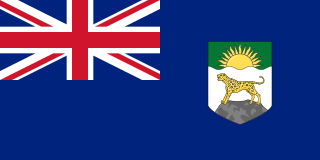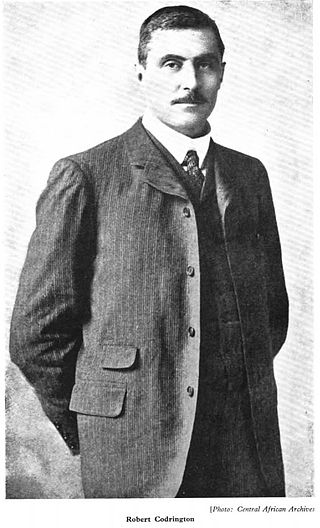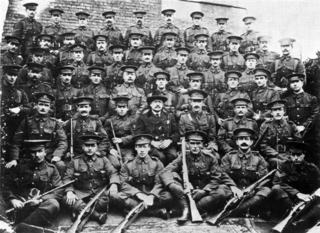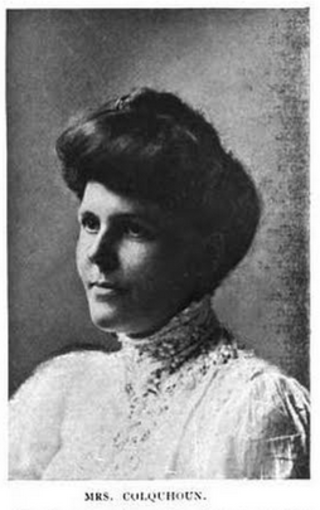Related Research Articles

Cecil John Rhodes was an English mining magnate and politician in southern Africa who served as Prime Minister of the Cape Colony from 1890 to 1896. He and his British South Africa Company founded the southern African territory of Rhodesia, which the company named after him in 1895. He also devoted much effort to realising his vision of a Cape to Cairo Railway through British territory. Rhodes set up the Rhodes Scholarship, which is funded by his estate.

Nyasaland was a British protectorate located in Africa that was established in 1907 when the former British Central Africa Protectorate changed its name. Between 1953 and 1963, Nyasaland was part of the Federation of Rhodesia and Nyasaland. After the Federation was dissolved, Nyasaland became independent from Britain on 6 July 1964 and was renamed Malawi.

Northern Rhodesia was a British protectorate in Southern Africa, now the independent country of Zambia. It was formed in 1911 by amalgamating the two earlier protectorates of Barotziland-North-Western Rhodesia and North-Eastern Rhodesia. It was initially administered, as were the two earlier protectorates, by the British South Africa Company (BSAC), a chartered company, on behalf of the British Government. From 1924, it was administered by the British Government as a protectorate, under similar conditions to other British-administered protectorates, and the special provisions required when it was administered by BSAC were terminated.

Southern Rhodesia was a landlocked, self-governing British Crown colony in Southern Africa, established in 1923 and consisting of British South Africa Company (BSAC) territories lying south of the Zambezi River. The region was informally known as South Zambesia until annexation by Britain, at the behest of Cecil Rhodes's British South Africa Company. The bounding territories were Bechuanaland (Botswana), Northern Rhodesia (Zambia), Portuguese Mozambique (Mozambique) and the Transvaal Republic.

The British South Africa Company was chartered in 1889 following the amalgamation of Cecil Rhodes' Central Search Association and the London-based Exploring Company Ltd, which had originally competed to capitalize on the expected mineral wealth of Mashonaland but united because of common economic interests and to secure British government backing. The company received a Royal Charter modelled on that of the British East India Company. Its first directors included The 2nd Duke of Abercorn, Rhodes himself, and the South African financier Alfred Beit. Rhodes hoped BSAC would promote colonisation and economic exploitation across much of south-central Africa, as part of the "Scramble for Africa". However, his main focus was south of the Zambezi, in Mashonaland and the coastal areas to its east, from which he believed the Portuguese could be removed by payment or force, and in the Transvaal, which he hoped would return to British control.

Arthur Lawley, 6th Baron Wenlock, was a British colonial administrator who served variously as Administrator of Matabeleland, Governor of Western Australia, Lieutenant-Governor of the Transvaal, and Governor of Madras. The fourth and youngest son of the 2nd Baron Wenlock, he attended Eton College and Trinity College, Cambridge, before joining the military. Serving in the Mahdist War, he reached the rank of captain before resigning his commission to pursue other interests. Lawley was then private secretary to his uncle, the 1st Duke of Westminster, and subsequently to the 4th Earl Grey, who he followed to Rhodesia.

Lieutenant-Colonel Sir John Robert Chancellor was a British soldier and colonial administrator.

North-Eastern Rhodesia was a British protectorate in south central Africa formed in 1900. The protectorate was administered under charter by the British South Africa Company. It was one of what were colloquially referred to as the three Rhodesian protectorates, the other two being Southern Rhodesia and Barotseland-North-Western Rhodesia. It was amalgamated with Barotseland-North-Western Rhodesia, another territory administered by the British South Africa Company, to form Northern Rhodesia in 1911.

Sir Charles Patrick John Coghlan,, was a lawyer and politician who served as Premier of Southern Rhodesia from 1 October 1923 to his death. Having led the responsible government movement in the territory during the latter days of Company rule, he was Southern Rhodesia's first head of government after it became a self-governing colony within the British Empire.

John Holland Rose was an influential English historian who wrote famous biographies of William Pitt the Younger and of French emperor Napoleon Bonaparte. He also wrote a history of Europe, entitled The Development of the European Nations among other historical works. He was Vere Harmsworth Professor of Imperial and Naval History at the University of Cambridge between 1919 and his retirement in 1934.

Robert Edward Codrington was the colonial Administrator of the two territories ruled by the British South Africa Company (BSAC) which became present-day Zambia. He was Administrator of North-Eastern Rhodesia, based at Fort Jameson, now Chipata, from 11 July 1898 to 24 April 1907, and then of North-Western Rhodesia, based at Livingstone from February 1908 to his death in London on 16 December 1908 from heart disease at age 39. He laid the foundation for the amalgamation of the two territories as Northern Rhodesia four years later.

Sir Herbert James Stanley, was a leading British colonial administrator, who served at different times as Governor of Northern Rhodesia, Ceylon and Southern Rhodesia.

The modern political history of Zimbabwe starts with the arrival of white people to what was dubbed Southern Rhodesia in the 1890s. The country was initially run by an administrator appointed by the British South Africa Company. The prime ministerial role was first created in October 1923, when the country achieved responsible government, with Sir Charles Coghlan as its first Premier. The third premier, George Mitchell, renamed the post prime minister in 1933.

The British South Africa Company's administration of what became Rhodesia was chartered in 1889 by Queen Victoria of the United Kingdom, and began with the Pioneer Column's march north-east to Mashonaland in 1890. Empowered by its charter to acquire, govern and develop the area north of the Transvaal in southern Africa, the Company, headed by Cecil Rhodes, raised its own armed forces and carved out a huge bloc of territory through treaties, concessions and occasional military action, most prominently overcoming the Matabele army in the First and Second Matabele Wars of the 1890s. By the turn of the century, Rhodes's Company held a vast, land-locked country, bisected by the Zambezi river. It officially named this land Rhodesia in 1895, and ran it until the early 1920s.
Lieutenant-Colonel Sir Marshal James Clarke was a British colonial administrator and an officer of the Royal Artillery. He was the first Resident Commissioner in Basutoland from 1884 to 1893; Resident Commissioner in Zululand from 1893 to 1898; and, following the botched Jameson Raid, the first Resident Commissioner in Southern Rhodesia from 1898 to 1905.

In August 1914, the United Kingdom declared war on the German Empire at the start of World War I. The settler society in Southern Rhodesia, then administered by the British South Africa Company, received the news with great patriotic enthusiasm. The Company administrator, Sir William Milton, wired the UK government, "All Rhodesia ... ready to do its duty". Although it supported Britain, the company was concerned about the possible financial implications for its chartered territory should it make direct commitments to the war effort, particularly at first. As a result, most of the colony's contribution to the war was made by Southern Rhodesians individually—not only those who volunteered to fight abroad, but also those who remained at home and raised funds to donate food, equipment and other supplies.

Ethel Maud Tawse Jollie OBE was a writer and political activist in Southern Rhodesia who was the first female parliamentarian in the British overseas empire.
Henry Wilson-FoxFRGS was an English lawyer, journalist, tennis player, and businessman. He built his career in Rhodesia, where he became an associate of Cecil Rhodes, manager of the British South Africa Company, and an advocate of Rhodes's imperialist ideals.

Barotziland–North-Western Rhodesia was a British protectorate in south central Africa formed in 1899. It encompassed North-Western Rhodesia.
Cinema of Zambia refers to the cinema and film industry of the country of Zambia.